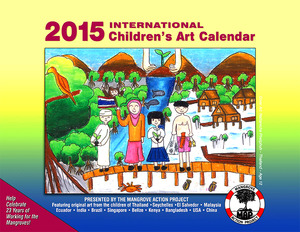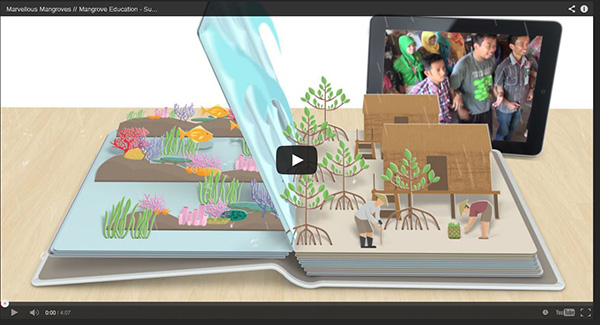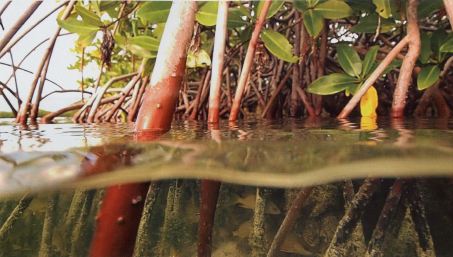FEATURE STORY MANGROVE ACCTION DAY photo entries announced

As part of this year’s Mangrove Action Day we asked to raise awareness of the connections people have with mangrove forests by creating a global photography exhibition. Throughout the month of July, we asked for and received incredible photos from around the world. We would like to thank each and every person who contributed to this project. We received submissions from over 40 individuals in 18 different countries, demonstrating the wide range of these amazing trees, as well as the people who care about them. VIEW THE GALLERY AFRICA Abidjan Convention Experts Agree on Mangrove Management Protocol

NIGERIA – Marine specialists agreed Wednesday to a protocol that would legally bind 22 countries within Abidjan Convention area to protect mangroves and manage them sustainably. The protocol had been undergoing its second review by experts before being sent to Convention member states for final revision final adoption by the next Conference of Parties to the Convention. The meeting in the south-eastern coastal Nigerian Calabar was symbolic as the city lies within the oil-bearing Niger Delta, which accounts for at least 10,000 square kilometres in area. The county has Africa’s and the world’s third concentration of mangroves. All eight species of mangroves in West Africa grow in the country. In a message to delegates at the meeting that began Monday, Abidjan Convention Regional Coordinator Abou Bamba said for decades states had developed national and transboundary strategies to stem the degradation of the mangrove ecosystems. READ MORE ASIA
Rubbish Awareness in the Mangroves

THAILAND – George H. Balazs Ph.D. brought marine rubbish awareness to Hawai’i’ in the 1970’s. explaining that sea turtles mistake drifting plastic bags for jellyfish – their favorite prey. Hawai’i is fairly clean, but does get hit with pelagic and tourist rubbish. Balazs autopsied numerous green sea turtles, finding up to two dozen plastic bags clogging sea turtles’ digestive tracks, dooming his specimens to slow death. In ocean-conscious Hawai’i this raised a red flag for marine rubbish awareness. I already accepted the Green Sea Turtle as my “Amakua” (family God), but Belazs amplified my passion for collecting marine rubbish. Thailand’s beaches are often backed by mangroves. Removing the rubbish from roots and trunks is difficult. I used to crawl on my hand and knees, but with a degenerated knee (companion to my degenerated mind) I find it much easier to just to crawl on my belly through the red ants, passing the plastic and Styrofoam to an assistant behind me. The ants are a hassle but it’s an efficient slog through deep mangroves. I spray my entire body with insect repellant –– and still wear swimming trunks. The bug juice doesn’t completely stop the ants. READ MORE India court cracks down on unlicensed shrimp farms

INDIA – The Madras High Court of India won’t tolerate shrimp farms that operate without licenses. On 5 August, the first bench of the court – chaired by Chief Justice Sanjay Kishan Kaul and Justice T. S. Sivagnanam – instructed the Tamil Nadu Government to take action against any prawn aquaculture activity being carried out in a village in Villupuram District without proper licensing. “The action for verification of the entitlement to hold the land is liable to be expedited and demarcation process to proceed quickly. If no valid license is in existence, action has to be taken to stop the prawn culture activity,” the justices said, as reported by The Hindu. Petitioners appeared before the court arguing for the closure of the aquaculture industry in the area, which resides over approximately 3,500 acres. Upwards of 100 shrimp farms have been operating illegally and have thus caused detriment to the marine ecosystem and surrounding villages, the petitioners said during the hearing. READ MORE AMERICAS Beginning to understand the importance of Mangroves

VENEZUELA – Researchers and communities participated on Monday July 27 at the seminar “Importance of Mangroves in the Marine Environment”, to debate the necessary protection of these areas, specifically those found in the Mochima National Park, located between Sucre and Anzoategui in Venezuela. The seminar took place at the Museum of the Sea, attached to the Universidad de Oriente (UDO. The regional director of the National Parks Institute (INPARQUES) in Sucre state, Nathalia Mago, said during the seminar held the following presentations: Mochima Coastal Ecosystems; Mangle Rojo and Botanical Organizations and Importance of Mangroves and Waterfowl Distribution and Aquatic. They involved researchers from the Oceanographic Institute of Venezuela and the UDO and communities Mochima. The idea is to raise the awareness of the community about the importance of mangroves in the ecosystem, the note said. READ MORE (EN ESPANOL) NGO advice makes sense, except for the shrimp boycott
USA – Recently, a series of recommendations for seafood consumers from environmental activist firm Food and Water Watch caught my eye, published online both by Huffington Post and Prevention magazine, two major reputable mainstream media publications here in the United States. Food and Water Watch is up-front about its campaign to drive awareness of the pitfalls of industrial-scale food production, and has some genuinely legitimate concerns that go way beyond the seafood industry, but some of this most recent offering of advice may do the industry more harm than good. Many of the group’s recommendations and assertions in the piece about popular (and some not-so-popular) seafood choices make a lot of sense – the group cites a number of Atlantic finfish as having stocks way too low to safely fish commercially, such as salmon, bluefin tuna and cod. The group also notes Patagonian toothfish (the piece refers to it by its common name, Chilean sea bass) and certain shark species are too rare and endangered to eat. Most industry leaders and experts would agree that these species are all in trouble, and have been for some time, with only limited fishing allowed if any fishing is allowed at all and, unfortunately for the fisheries that once made a living off of these species, the science says that’s probably the way it should be for now. READ MORE Stakes high for Antigua’s ecosystems as mega-resort ploughs ahead
ANTIGUA – Gasping to escape the suffocating smog in Beijing? Then consider the pristine shores of Guiana Island, the largest of a cluster of scenic islets off the north-eastern shores of Antigua – the main site of Yida International Investment Group’s dazzling new 1600 acre Special Economic Zone and tourist complex. China’s Yida Group is marketing what could be the Caribbean’s largest construction project as the ideal location in which to enjoy unspoilt natural beauty in luxurious comfort. The irony is that to create such an idyll, they will destroy the local environment and contravene legislation designed to protect it, local conservationists say. Yida and the government of Antigua and Barbuda are trying to attract investors, businesses and holidaymakers to a new Special Economic Zone consisting of a 300-room Hard Rock Hotel and Casino complex and numerous other commercial developments. Yida is reported to be investing around 2 billion east Caribbean dollars (US$ 750 million) in the development which is set for completion by late 2017. READ MORE Venezuelan children draw dots of color, in the mangroves

VENEZUELA – Aiming to Promote Environmental Education, Mangrove Action Project (MAP) in partnership with the Ecological Association for Environmental Preservation of Falcon state (AEPA Falcon) are driving the Children’s Art Contest “Points of Color in the mangrove” which began last July 15. Henderson Hill executive director of the NGO AEPA Falcon, says “it is a privilege to give the opportunity to see what our children express mangrove biodiversity and its current situation. The message of environmental protection should therefore begin right now.” The contest was held in Vargas, Miranda, Nueva Esparta, Zulia and Falcon, With the support of NGOs in each region, including AC Green Dot and Environmental Movement “Botanical” it is also important to note the support of various companies and institutions such as: The General Comptroller of the State Falcon, Venetcable, INNOVECA, UNEFM, UDEFA, COTRAEDUP and La Commune “Force caquetía” the Municipality Falcon. READ MORE EUROPE Sustainable development is failing but there are alternatives to capitalism
PARIS – All over the world, environmental justice movements are challenging growth-oriented development and neoliberal capitalism. In the face of worsening ecological and economic crises and continuing social deprivation, the last two decades have seen two broad trends emerge among those seeking sustainability, equality and justice. First there are the green economy and sustainable development approaches that dominate the upcoming Paris climate summit and the post-2015 sustainable development goals(SDGs). To date, such measures have failed to deliver a harmonization of economic growth, social welfare and environmental protection. Political ecology paradigms, on the other hand, call for more fundamental changes, challenging the predominance of growth-oriented development based on fossil fuels, neoliberal capitalism and related forms of so-called representative democracy. READ MORE OCEANA New study shows mangroves may protect against sea level rise

NEW ZEALAND – New research shows mangrove forests could play a crucial role in protecting coastal areas from sea level rise caused by climate change. A joint study between Associate Professor Giovanni Coco from the University of Auckland’s School of Environment and colleagues at the Universities of Southampton (Dr Barend van Maanen) and Waikato (Dr Karin Bryan), used leading-edge mathematical simulations to study how mangrove forests respond to elevated sea levels. The new model incorporates biophysical interactions to study the formation of tidal channel networks, how these channels are modified by mangroves and how mangroves are in turn affected by channel evolution. The researchers studied the evolution of the channels by using a hybrid model that connects biotic (mangroves) and abiotic (currents and transport of sediment) processes, to simulate their interaction. In particular the research focused on how estuarine environments with and without mangroves responded to sea level rise. The study also used longer timeframes than have been incorporated into this type of modelling work than ever before, studying mangrove evolution for hundreds of years. READ MORE LAST WORD(S) WHAT? No last word? Send us your letters and comments BACK TO TOP
Not yet a subscriber? Please cut and paste these news alerts/ action alerts on to your own lists and contacts. Help us spread the word and further generate letters of concern, as this can make a big difference in helping to halt a wrongdoing or encourage correct action. ACTION ALERTS WANTED: MAP News is looking for links to calls to actions/petitions and letter writing campaigns on mangrove issues, tropical coastal communities and other related topics. Not all submissions can be selected, but we look forward to hearing about your work and want to let our readers’ voice be heard! Email submissions to news@mangroveactionproject.org | Action Alerts: ECADOR’s fight for Water – Sign the Petition Save Guanaja for Future Generations! Improve, not Sacrifice! SIGN OUR PETITION Marvellous Mangroves Curriculum in Bangladesh – WATCH VIDEO MANGROVE ART DEADLINE EXTENDED!
MAP’s annual Children’s Mangrove Art Contest for MAP 2016 calendar deadline is extended to AUGUST 21! DETAILS HERE
A fun and exciting Art Contest for children 6 to 16 years old. We invite all primary school children from tropical and sub-tropical nations, and whose schools are located near mangroves, to create art telling us “why mangroves are important to my community and me?”. Selected winners will be published in a 2016 calendar to be distributed internationally to raise awareness of mangrove forest ecology. READ MORE No trans shipping Port Portland Bight Protected Area, Jamaica SIGN OUR PETITION Volunteer Opportunities with Mangrove Action Project CLICK HERE STOP PLANTING MANGROVES ON SEAGRASS BEDS _ A CALL TO ACTION Introducing the “refreshed” Blue Planet Links website, a go-to resource for teachers, students, and the interested public as they navigate the web for useful material about water. What is CBEMR? Easy to follow fact sheet – CLICK HERE 
Our short presentation will give you a better understanding of the issues we are working to solve. WATCH PRESENTATION
SHARE MAP’S VISION
CLICK HERE to watch short introductory video. Together we can work “at the roots of the sea”. Join us in saving our beautiful country!
We hope you have been following the ongoing battle in Bimini, Bahamas.
We are in need of your help more than ever Click here Exclusive Interview with Alfredo Quarto, Co-Founder and Executive Director of Mangrove Action Project – See more Question Your Shrimp- Don’t Buy or Sell Imported Tropical Shrimp! Sign the Petition
Marvellous Mangroves CurriculumMARVELLOUS MANGROVES IN BRAZIL
En Portuges 
Marvellous Mangroves – A Curriculum-Based Teachers Guide. FOR MORE ON MAPs AWARD WINNING CHINA MANGROVE CURRICULUM VISIT

VIMEO SHOW VISIT OUR “MM” WEBPAGE Check out our presentation for more details on Marvellous Mangroves “Education In The Mangroves” can now be seen on the PhotoPhilanthropy website here! Read this 10 page history of the development of MAP’s educational curriculum VIEW DOCUMENT Article in Canada’s Green Teacher Magazine – Read More
FREE MAP Mangrove e-cards CLICK HERE
 MAP’s e-Cards offer you a unique way to spread the word about MAP’s good works, while sharing beautiful photographs of the mangroves
Donate to MAP via Paypal
Giving could never be easier  It’s the action, not the fruit of the action, that’s important. You have to do the right thing. It may not be in your power, may not be in your time, that there’ll be any fruit. But that doesn’t mean you stop doing the right thing. You may never know what results come from your action. But if you do nothing, there will be no result. It’s the action, not the fruit of the action, that’s important. You have to do the right thing. It may not be in your power, may not be in your time, that there’ll be any fruit. But that doesn’t mean you stop doing the right thing. You may never know what results come from your action. But if you do nothing, there will be no result. —Mahatma Gandhi Green Planet Fundraising Assists MAP – LEARN MORE
MANGROVE ISSUES The importance of restoring mangroves in an effective, long-term manner. Mangrove CBEMR video – VIEW Question Your Shrimp Consumer/Markets Campaign! WATCH VIDEO Mangrove Restoration in Asia – Watch Short Video 
READ A MOSAIC OF LIFE Peek into the underwater world of mangroves, “womb of the sea.” By Liz Cunningham Photos By Wes Matweyew and Liz Cunningham
“Question Your Shrimp” Campaign Learn more about the affects of the shrimp industry on mangroves by visiting our blog Editor’s Note: Mangrove Action Project’s Executive Director, Alfredo Quarto was interviewed about shrimp by Green Acre Radio’s Martha Baskin LISTEN TO INTERVIEW Information sheds clear light on shrimp-mangrove connection
Join MAP on Facebook
Sign the Consumer’s Pledge to avoid imported shrimp
Not yet a MAP News subscriber?
Click here to subscribe.
Note to Our Readers:
We strive to keep active links in our newsletter. However, due to circumstances beyond our control, occasionally links to stories may become broken. If you find a link to a story is not functioning, please cut and paste the headline into your browser search bar. In most cases you should be able to locate the original story.
Help Mangrove Action Project through your recycled E-Waste. List of Accepted E-waste Items: Injet Cartidges, Cell Phones, Pagers, GPS, Radar Detectors, Mobile Hot Spots, Calculators, eBook Readers, iPods/MP3 players, Digital/Video Cameras/Camcorders, PDAs, iPads/Tablets/Laptops, Video Game Consoles, Handheld Video Games Visit the Mangrove Action Project recycle website Click on the recycle button then click on the Download Shipping Label, and follow the instructions. |














